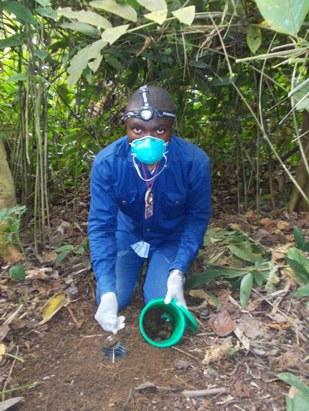Dung beetles are crucial to the health of ecosystems. They help recycle nutrients, suppress parasites and even disperse seeds. They are also highly dependent on other animals — specifically, what those other animals leave behind — which influences the size, distribution and composition of dung beetle populations.
For his 2014 CARN research, Elvis Mongyeh surveyed dung beetle communities in southwestern Cameroon, to both assess overall ecosystem health and predict mammal diversity. Mongyeh, a Ph.D. student in zoology at Cameroon’s University of Buea, conducted his research in Mount Cameroon National Park. Mount Cameroon itself is an active volcano, the largest peak in Central Africa, and a unique biome with endemic flora and fauna. Monitoring mammal populations in the park is a resource-intensive process; dung beetles are much easier and cheaper to sample. Over the course of 12 months, Mongyeh collected more than 5,400 dung beetles, members of six different genera, using baited pitfall traps. He found that dung beetle abundance varied seasonally. Elevational gradients also influenced the distribution and abundance of dung beetles.
Mongyeh is still working to analyze his CARN data. He is collaborating with Keith Philips, a professor and entomologist from Western Kentucky University on this research. In 2016, he traveled to WKU to better learn how to identify dung beetles down to the species level, and to connect his field work data to diversity indices.
